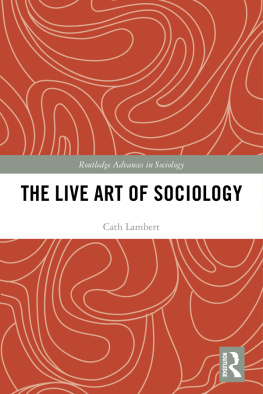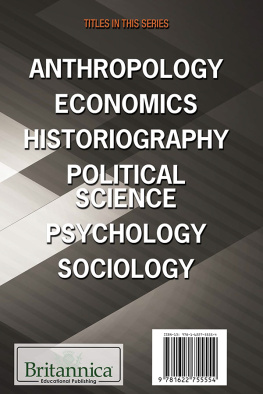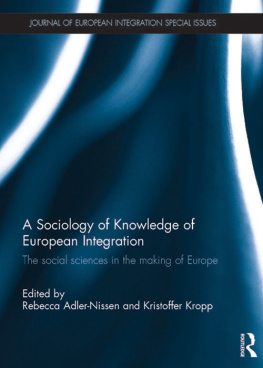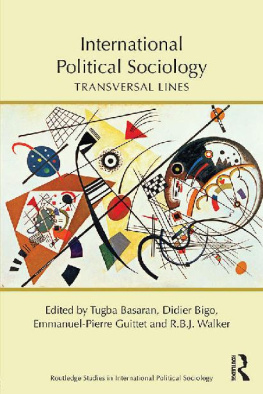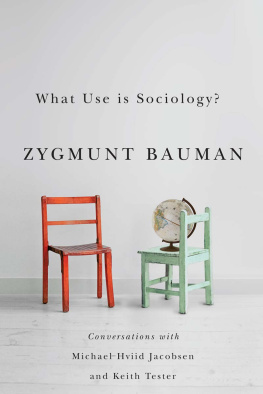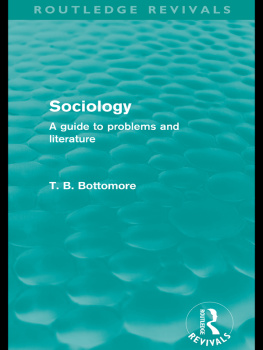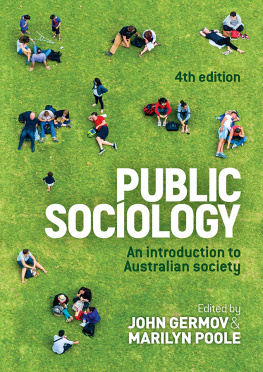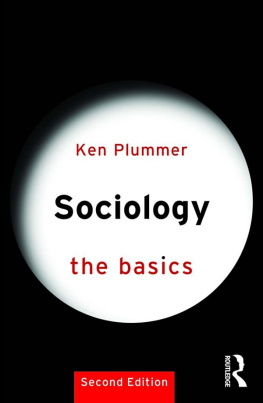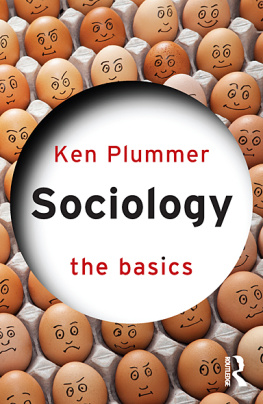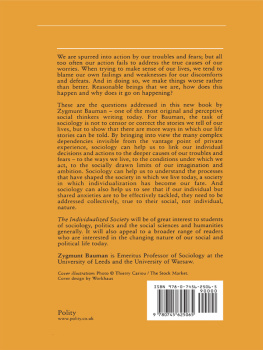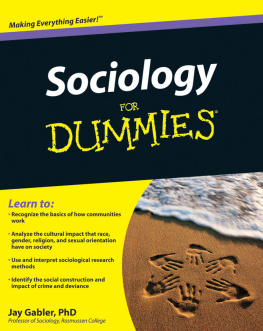Table of Contents
Guide
Print Page Numbers
This is a wonderful, lucid and scholarly exploration of the new opportunities for the conduct of an artful sociology that is vital and publicly engaged. The way Lambert links live sociology with debates about performativity and the queering of live sociology is brilliant and really pushes this cluster of methodological practices and ideas into new and exciting directions.
Les Back, Professor, Sociology Department, Goldsmiths University of London, UK
Cath Lambert has given us a treasure trove in The Live Art of Sociology, brimming as it is with intellectual resources and real- world examples that breathe fresh life into sociological aesthetics. By encouraging us to recognise and stay with the discomfort that comes from uncertainty and not- knowing, this beautifully written and generative work opens sociological thinking and methodology to the affective, haptic and other sensual registers of the social world. With queer feminist politics at its beating heart, The Live Art of Sociology is the book so many of us have been waiting for. An animated, insightful, witty and ethically provocative companion.
Yasmin Gunaratnam, Reader, Sociology Department, Goldsmiths University of London, UK
The Live Art of Sociology
The Live Art of Sociology attends to the importance of the live in contemporary social and political life. Taking existing work in live sociology as a starting point, this book considers some of its aspirations through unique empirical investigations. Queer and feminist theory and methods are also employed in exploring the challenges of researching live experiences and temporalities. With case study examples ranging from the work of live body artists to experiments in curating sociological research, Lambert successfully demonstrates the diverse ways in which art can provide the aesthetic and affective conditions for social and political disruption.
By emphasising the political importance of how people, knowledges, materials, emotions and senses are configured and reconfigured, The Live Art of Sociology asserts a creative and vital role for sociology in not only representing but also generating social realities and political possibilities. Putting aesthetics at the heart of contemporary sociology and making a strong case for a renewed socio- logical aesthetics, this volume will appeal to undergraduate and postgraduate students as well as postdoctoral researchers and academics interested in fields such as Sociology, Cultural Studies, Art and Visual Culture, Gender and Sexuality Studies and Leisure Studies. It will also be of interest to creative practitioners.
Cath Lambert is Associate Professor of Sociology at the University of Warwick, UK.
Routledge Advances in Sociology
For a full list of titles in this series, please visit www.routledge.com/series/SE0511
Child Figures, Literature, and Science
Fragile Subjects
Edited by Jutta Ahlbeck,
Pivi Lappalainen, Kati Launis and Kirsi Tuohela
Mass Shootings in
Comparative Perspective
Communities and Shared Experiences in the Aftermath Johanna Nurmi
Mega- Events as Economies of the Imagination
Creating Atmospheres for Rio 2016 and Tokyo 2020
Rodanthi Tzanelli
Senses In Cities
Experiences of Urban Settings
Edited by Kelvin E.Y. Low and Devorah Kalekin- Fishman
Shared Housing, Shared
Lives
Everyday Experiences Across the Lifecourse
Sue Heath, Katherine Davies, Gemma Edwards and
Rachael M. Scicluna
Helicopter Parenting and Boomerang Children
How Parents Support and Relate to Their Student and Co- Resident Graduate Children
Anne West and Jane Lewis
New Directions in Elite
Studies
Edited by Johan Heilbron,
Felix Bhlmann,
Johs. Hjellbrekke, Olav Korsnes and Mike Savage
Reflections on Knowledge,
Learning and Social Movements
Historys Schools
Edited by Aziz Choudry and Salim Vally
Social Generativity
A Relational Paradigm for Social Change
Edited by Mauro Magatti
The Live Art of Sociology
Cath Lambert
The Live Art of Sociology
Cath Lambert

First published 2018
by Routledge
2 Park Square, Milton Park, Abingdon, Oxon OX14 4RN
and by Routledge
711 Third Avenue, New York, NY 10017
Routledge is an imprint of the Taylor & Francis Group, an informa business
2018 Cath Lambert
The right of Cath Lambert to be identified as author of this work has been asserted by her in accordance with sections 77 and 78 of the Copyright, Designs and Patents Act 1988.
All rights reserved. No part of this book may be reprinted or reproduced or utilised in any form or by any electronic, mechanical, or other means, now known or hereafter invented, including photocopying and recording, or in any information storage or retrieval system, without permission in writing from the publishers.
Trademark notice: Product or corporate names may be trademarks or registered trademarks, and are used only for identification and explanation without intent to infringe.
British Library Cataloguing in Publication Data
A catalogue record for this book is available from the British Library
Library of Congress Cataloging in Publication Data
A catalog record for this book has been requested
ISBN: 978-1-138-93232-6
(hbk) ISBN: 978-1-315-67934-1 (ebk)
Typeset in Times New Roman
by Wearset Ltd, Boldon, Tyne and Wear
For Tobias and Alexandra
Contents
Unless otherwise credited, all photographic images have been produced by the author.
This book draws on research, thinking, conversations, encounters and adventures spanning over a decade. It is therefore safe to say that all good friends and colleagues have played a part somewhere along the way: there are too many people in this category to name here, but I give a generalised note of gratitude and will thank you all properly (that is, with sparkling wine and samosas, of course) in the course of time.
I am grateful to the collective of feminist academics who helped nurture and sustain my creativity and sanity in the latter stages of my PhD and the early days of my academic career. They are Louise Archer, Jacky Brine, Carole Leathwood, Diane Reay and Valerine Hey. Through our singing, satire, poetry and generally subversive performative interventions as FAAB, I learnt it was not only possible but also (sometimes) necessary to do academia differently. During this time I also benefitted from the generous intellectual spirit and friendship of Anala Meo.
Some of the earlier experimental practices discussed in this book were developed under the auspices of the Reinvention Centre for Undergraduate Research. The Reinvention Centre was a Centre for Excellence in Teaching and Learning that ran for five years (20052010) between the Universities of Warwick and Oxford Brookes. The team I was lucky to work with at Warwick provided supportive, scholarly space for working against the grain of hegemonic knowledge production in higher education. Sociologists Talking (2008, 2009) and The Idea of a University

